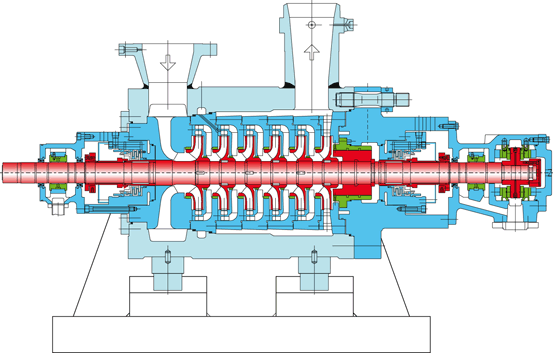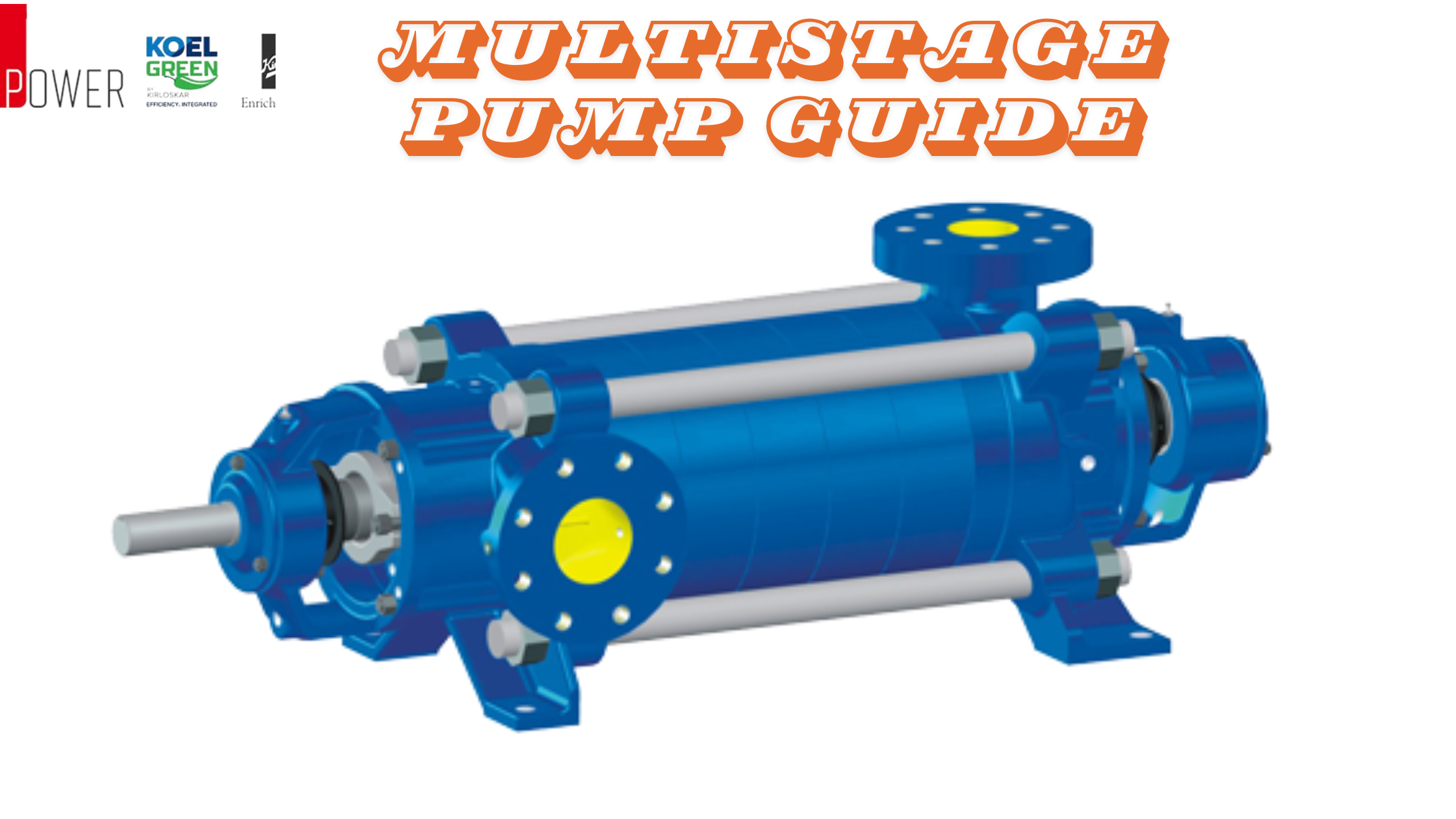Multistage pumps are beneficial for Industries. They consider it for handling the high pressure because this pump set is capable enough to handle the pressure. In this blog, we’ll explore every single detail about these multistage pumps. Also, you’ll get to know the types of pumps, their advantages and disadvantages. So let’s discuss it.
How Do Multistage Pumps Work
Having primed the pump, the fluid gets drawn into the pump inlet at suction line pressure into the first chamber.
The fluid then flows through the impellers one after the other starting from the left-most impeller and moving to the rightmost impeller. Last of all, the fluid exits at some higher pressure. One impeller discharges into the next one, and at each stage, the pressure rises even more.
The number of stages or impellers in a pump determines the final discharge pressure of the pump the more the impellers the higher the pressure. While the fluid pressure rises with every stage, the flow range is always constant for a specific RPM.

Multistage pump working principle
Impellers in such designs are placed in Ring Sections on the shaft and each ring section contains an Impeller with suction casing on one side and discharge casing / diffuser on the other side.
The impeller will suck the fluid through the suction casing, to the circumference of the impeller before being thrown out through the discharge casing, which will then flow to another ring section until the fluid is discharged through the outlet.
The ring sections are connected by tie bolts that go around the casing. Internal designs of the shaft seals and bearings can be different where they are located at one end of the pump or both depending on duty and application.
When stages of impellers are added the flow rate is not affected but the total head and shaft power is affected by the number of stages added. Both stages have an impeller and a diffuser.
Models can be constructed either vertically or horizontally based on the fact that there are designs that need to be space saving or designs that can be serviced without having to remove the motor.
Advantages of Multistage Pumps
- Since multistage centrifugal pumps have several impellers they can raise the water pressure in a series ( from one stage to the other) and therefore deliver higher pressures than a similar-sized single impeller pump.
- The head per stage is less, which means that it is possible to use relatively small-sized impellers with close tolerances and hence, there will be less leakage loss.
- Multistage pumps also assist in saving space on the floor. Further, these pumps have small impeller diameters and narrow clearances, and they also use less motor horsepower, and therefore, are more effective.
- Compared to single-stage pumps, multi-stage pumps of the same discharge pressure output are less noisy when the number of stages is higher.
Applications of Multistage Pumps
Because of the close tolerance between the impeller and the pump volute, multistage pumps cannot handle solids and abrasive content unless the pump is oversized, and therefore, they are used with water and other low-viscosity fluids. This combined with their high-pressure range, makes multistage water pumps popular in applications including:
- Boiler feed
In industries, multistage pumps are utilized as boiler feed pumps. They pump water at high strain to the boilers which is fundamental in making steam and guaranteeing the productive working of boilers.
- Water supply boosting
In municipal water supply systems, multistage pumps are frequently used to maintain a constant water pressure. They aid the transportation of water from treatment plants to the shoppers’ premises, whether private or business.
- Irrigation
In agriculture, multistage pumps are used for irrigation purposes. It applies the necessary force to spread water over large fields to ensure that crops grow well.
- Water circulation
Multistage pumps are good in water circulation. Such functions like filtration, addition of chemicals and distribution of the treated water are well suited to bear the high pressure and high flow rate
- Fire Fighting
Multistage pumps are also utilized in fire fighting systems. They assure of a steady and powerful water supply which is important in extinguishing fires within the shortest time possible.
Where and why are multistage pumps applied?
Such equipment is used for a variety of reasons:Such equipment is used for a variety of reasons:
- A centrifugal pump for high head discharge is needed but is beyond the capability of a single stage centrifugal pump which has a maximum discharge pressure of 150M vs 1000M from designs with multiple impellers. A high discharge pressure requirement may be due to factors such as; the need to supply high floors in skyscraper with domestic water, this implies a long fluid path with high friction losses as is the case with pressure booster set applications, or it may be a filtration process where a low viscosity liquid is to be pumped through a fine filter as in the case of reverse osmosis.
- Where an economic and efficient solution is needed of a clean fluid at high pressure, a multistage design can be used which is more efficient, as the impellers are not only smaller but at full impeller size meaning they are efficient even when run at lower RPM.
Single stage designs are trimmed to duty point and hence, the efficiency is less as the clearances are more between the edge of the impeller and casing.
Conclusion
Multistage pumps are the most proficient, dependable and adaptable pumping frameworks reasonable for some high-pressure applications. Whether you require an upward multistage pump for an elevated structure or a level multistage siphon set for modern applications, the fundamentals and advantages of the siphons will help you in pursuing the ideal choice. It is essential to ensure that the multistage pump is properly installed and maintained for many years in order to get the most out of it.
FAQ
⇩ What criteria should I use to select a specific multistage pump?
A portion of the elements to take a gander at incorporate; stream rate and tension, material sort, space accessible for establishment and simplicity of support. This will help you in going with the best choice of picking the right siphon to accommodate your prerequisites.
⇩ What is the difference between multistage pumps that are classified as horizontal and those classified as vertical?
Horizontal multistage pumps have their impellers on a flat shaft and are very simple to keep up with. Vertical multistage pumps have their impellers mounted on an upward shaft and they are more minimal in plan, consequently great for frameworks with restricted space.
⇩ What criteria should I use to select a specific multistage pump?
A portion of the elements to take a gander at incorporate; stream rate and tension, material sort, space accessible for establishment and simplicity of support. This will help you in going with the best choice of picking the right siphon to accommodate your prerequisites.


Leave a Reply